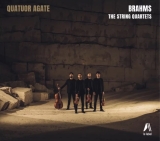Der Name des Quartetts zeigt bereits seine tiefe Verbundenheit mit der Musik dieses Komponisten. Denn die Widmungsträgerin des zweiten Streichsextetts war seine zweite Liebe, Agathe von Siebold. Nunmehr sahen die vier Streicher die Zeit als gekommen, eine Aufnahme zu wagen.
Das Wagnis hat sich gelohnt. Mit einer Frische und Lebendigkeit, die alle Hinweise auf den trockenen Norddeutschen Lügen straft, bewegen sie sich mit überbordender Spielfreude in den Werken. Manche Passagen geraten so aufgewühlt, dass man gar ein Entgleisen befürchten mag, aber nichts dergleichen geschieht. Vielmehr schafft das Quartett mit dieser inspirierten Herangehensweise einen improvisierend klingenden Zugriff, der jede Idee von Routine wegwischt. Doch vermag es das Ensemble gleichzeitig, die Ernsthaftigkeit und Stärken der Musik zu zeigen, ohne die es denn bei Brahms auch nicht geht.
Das Quartett op. 67 ist nach Brahms eigenen Worten mit einem leichteren Entstehungsprozess verbunden. Hier standen eher Mozart und vor allem Haydn Pate als bei den Werken op. 51 Beethoven und Schubert. Und genau diese entspanntere Herangehensweise wird etwa im Kopfsatz, der mit mehrmals wechselnden 6/8- und 2/4-Takten in einen auffallend komischen Höhepunkt in der Coda geführt wird, vom Quatuor Agate gezeigt. Und auch das lassen die vier Musiker deutlich werden, dass das idyllische Andante und der von der Viola dominierte dritte Satz, von Brahms selber als das “Verliebteste, Zärtlichste” gekennzeichnet, mit sorgsamer Liebenswürdigkeit hergerichtet werden. Im Variationenfinale, wieder bei Haydn anknüpfend, führen sie das fast burschikose Allegretto-Thema und damit das ganze Werk sozusagen in bester Laune zu Ende.
Primarius Adrien Jurkovic hat dann noch die Romanze aus den sechs Klavierstücken op. 118 für das Ensemble hergerichtet. Diese wunderbare Melodie im für Brahms typischen 6/4-Takt wird im zweiten Teil zunächst in der Intensität gesteigert, bevor diese nachlässt. Nach einem Teil mit Trillerketten und Tonleiterpassagen, der wie improvisiert wirkt, folgt ein Übergang, bevor ein komprimiertes Ende anschließt. Die stimmungsvoll gestaltete Einrichtung wird von den vier Musikern sensitiv dargeboten.
The name of the quartet already shows its deep connection with the music of this composer. For the dedicatee of the second string sextet, Agathe von Siebold, was his second love. Now the four string players felt the time had come to make a recording. The venture was worthwhile.
With a freshness and liveliness that belies all references to the dry North German character, they move through the works with an exuberant joy of playing. Some passages so agitated that one might even fear a derailment, but nothing of the sort happens. Rather, with this inspired approach, the quartet creates an improvisational sounding approach that wipes away any idea of routine. At the same time, however, the ensemble is able to show the seriousness and strengths of the music, without which Brahms could not do without.
According to Brahms himself, the Quartet op. 67 is associated with an easier compositional process. Mozart and above all Haydn were the inspiration here rather than Beethoven and Schubert for the op. 51 works. And it is precisely this more relaxed approach that is demonstrated by the Quatuor Agate in the opening movement, for example, which leads to a strikingly comic climax in the coda with several alternating 6/8 and 2/4 bars. The four musicians also make it clear that the idyllic Andante and the third movement dominated by the viola, characterized by Brahms himself as the « most amorous, most tender », are played with careful loveliness. In the variations of the finale, again inspired by Haydn, they bring the almost boyish Allegretto theme and thus the whole work to a close in high spirits, so to speak.
Primarius Adrien Jurkovic then transcribed the Romance from the Six Piano Pieces op. 118 for the ensemble. This wonderful melody in Brahms’ typical 6/4 time is initially increased in intensity in the second part before it subsides. After a section with chains of trills and scale passages, which seems improvised, a transition follows before a compressed ending. The atmospheric arrangement is performed sensitively by the four musicians.
























